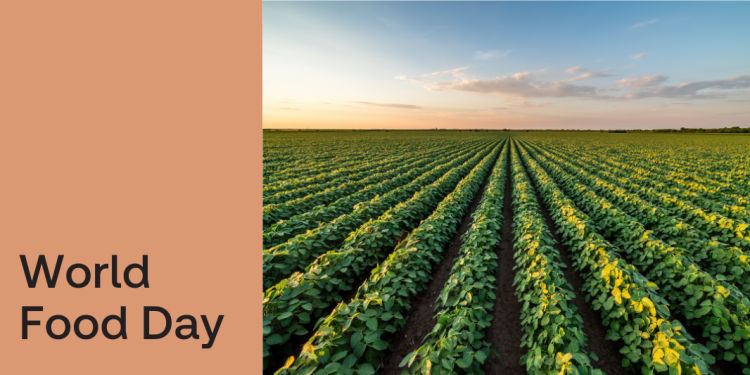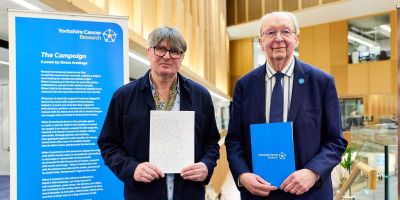How our food research supports better food futures

This World Food Day (16 October), we take the opportunity to highlight just some of the many ways researchers in the Faculty of Biological sciences are working to improve food futures.
This year’s theme is ‘Hand in Hand for Better Foods and a Better Future’. The campaign, led by the Food and Agriculture Organization (FAO), is calling for global collaboration to transform agrifood systems so that everyone has access to healthy diets while protecting the planet’s resources.
In the Faculty of Biological Sciences, and working in partnership with interdisciplinary networks including the Priestley Centre for Climate Futures and the Global Food and Environment Institute, researchers are contributing to the vision for a better food future - from exploring molecular biology, plant cells and crop resilience to working with global communities, as well as UK and international collaborative projects that are influencing food policy.

Image: Farmers planting maize and soya in Zambia. Photo by Hemant Tripathi
World Food Day researcher spotlights
This month we are spotlighting some of the faculty researchers and their food-related research projects:
Dr Hemant Tripathi, Postdoctoral Research Fellow
Dr Tripathi’s research bridges ecology, agriculture and public health, focusing on smallholder farming systems in Africa. His work explores how biodiversity, soil health and climate resilience can help communities grow food sustainably and strengthen local livelihoods.
Dr Josie South, Associate Professor and Future Leaders Fellow
Dr Josie South explains her project focusing on investigate invasive species and inland fisheries. Through international and community-led collaborations, the work is challenging assumptions about aquaculture, and advocates for food futures that are both ecologically sound and socially just.
Dr Richa Yeshvekar, Postdoctoral Research Associate
Dr Richa Yeshvekar’s research in plant cell biology and crop genetics aims to improve crop resilience. Growing up in Maharashtra, India, she saw how poor harvests affected communities, and the experience inspired her to explore how crops that can better withstand climate stress.
Latest research and events round-up
Agri-Food for Net Zero (AFN) Network+ Report
A new report released by the AFN Network+, and co-led by the Faculty’s Professor Stefan Kapinski and Professor Tim Benton, warns that the UK’s food system needs radical transformation on a scale not seen since the Second World War. The report calls for coordinated action across farming, diets, and land use to create a resilient, low-carbon food system.
Black in Plant Science Conference
The Black in Plant Science Conference is designed to celebrating inclusivity in research and highlight the contributions of Black researchers, past and present. As part of the day, there will be a workshop chaired by Dr Nicola Patron titled ‘Delivering Impact on African Crops’, exploring how research on resilient, nutritious African crops can drive food security and innovation. The workshop will be also be discussing how training and equitable partnerships can impact science and innovation. Look out for the highlights following the event.
University Farm to become a hub for climate smart research
In September, the University of Leeds Farm received Horizon Europe funding to become a climate-smart agriculture hub. Aiming to cut greenhouse gas emissions by 55% in five years, the initiative will test innovations in regenerative farming, livestock feed, soil management and precision technologies.
Saving vital food crops by identifying genetic targets
In this recent feature story on the University’s Research and Innovation hub, read about how Professor Benitez-Alfonso’s lab is revealing how plant cell communication and cell-wall structures control growth and stress responses. Find out more about her work to bridge molecular biology and agricultural innovation, and support global food security.
Interested in sharing your food-related work?
If you’re conducting research related to food, agriculture or sustainability, please contact FBS Communications to discuss future features and researcher spotlights.
And don’t forget to follow the new Health and Life Sciences LinkedIn page for the latest research stories and opportunities to connect.




